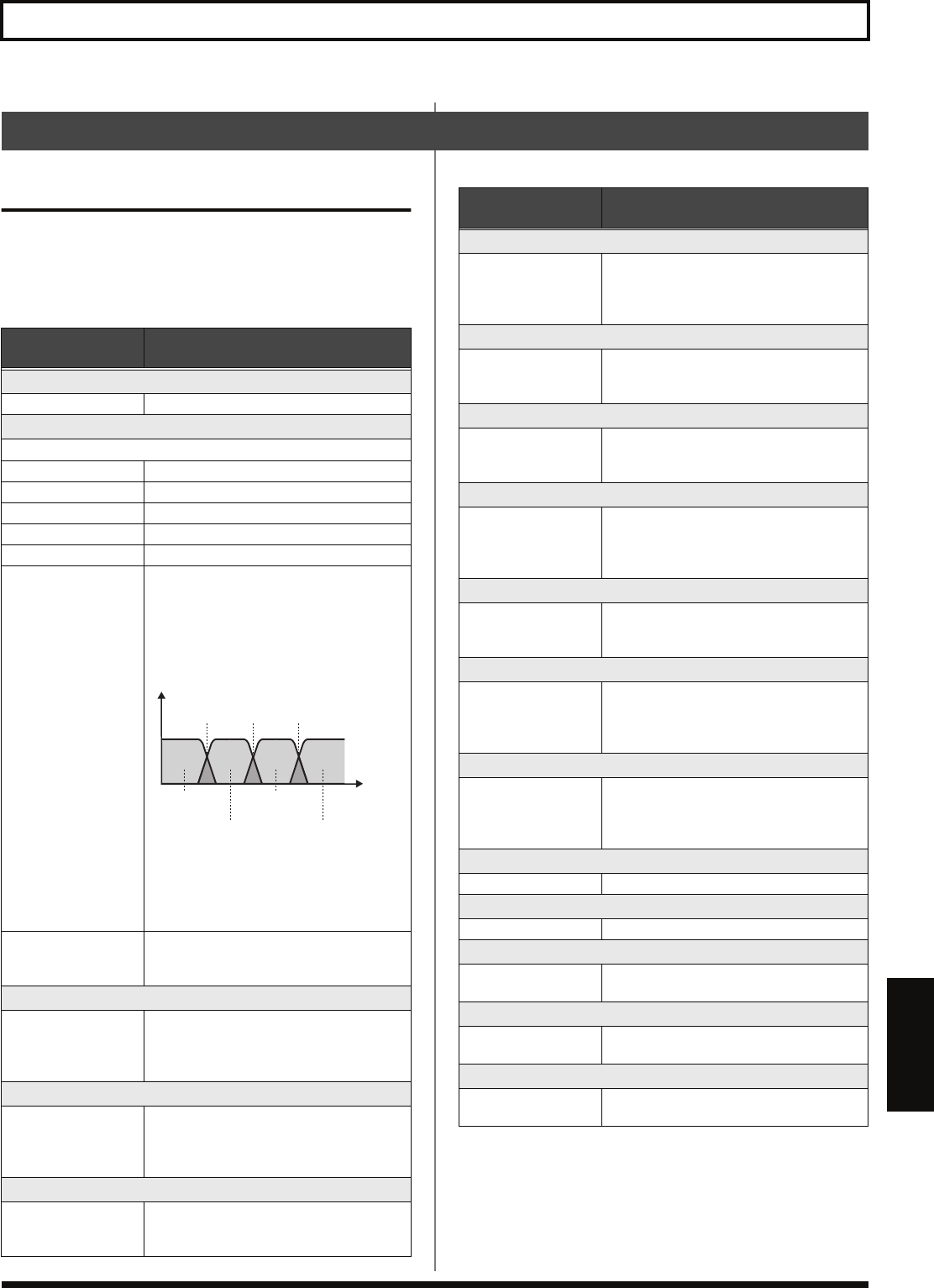
111
FX (Effects) Chapter 8 Parameters Guide
Chapter 8
COMP (Compressor)
This is an effect that attenuates loud input levels and boosts soft
input levels, thus evening out the volume to create sustain without
distortion. Many different types of compression are provided,
including digital models of vintage compressors, as well as limiters
that suppress only the sound peaks.
*1 Setting available with Type set to BOSS COMP or D-COMP.
*2 Setting available with Type set to BOSS LIMITR, RACK 160D,
or VTG RACK U.
*3 Setting available with Type set to BOSS COMP, D-COMP, BOSS
LIMITR, RACK 160D, or VTG RACK U.
*4 Setting available with Type set to MULTI BAND.
*5 Setting available with Type set to NATURAL.
FX (Effects)
Parameter/
Range
Explanation
COMP SW
OFF, ON Turns the COMP effect on/off.
TYPE
Select the compressor type.
BOSS COMP Models the BOSS CS-3
D-COMP Models the MXR DynaComp.
BOSS LIMITR This selects a stereo limiter.
RACK 160D Models the dbx 160x.
VTG RACK U Models the UREI 1178.
MULTI BAND This limiter lets you divide the input signal
into four separate bands—ultra low, low,
high, and ultra high frequency ranges—and
apply different settings to the low and high
frequency ranges. You can set the frequen-
cies separating each band using the XOVER
F L, M, and H parameters.
* The limiter is applied neither to the ultra low
range, which is critical to the bass’s sound,
nor to the ultra high range, which affects the
nuance of the attack.
NATURAL
This compressor is configured using the
same frequency divisions as MULTI BAND,
but with simplified parameter settings.
SUSTAIN *1
0–100
This adjusts the intensity of the effect that
amplifies a weak input signal to produce a
uniform volume level. Larger values will re-
sult in longer sustain.
THRSH *2
0–100
Adjust this as appropriate for the input sig-
nal from your bass. When the input signal
level exceeds this threshold level, limiting
will be applied.
RATIO *2
1:1–
∞
:1
This selects the compression ratio used with
signals in excess of the threshold level. Higher
values create a stronger compression effect.
Frequency
Ultra Low
Frequency Range
Low Frequency
Range
High Frequency
Range
Ultra High
Freqency Range
XOVER F L XOVER F M XOVER F H
Parameter/
Range
Explanation
ATTACK *3
0–100
Adjusts the strength of the playing attack
when the strings are played. Higher values
result in s sharper attack, creating a more
clearly defined sound.
REL *2
0–100
Adjusts the time from when the signal level
drops below the threshold until when limit-
ing is removed.
LOW THRSH *4
0–100
In the Low Frequency Range, when the in-
put signal level exceeds this threshold level,
limiting will be applied.
LOW RATIO *4
1:1–
∞
:1
In the Low Frequency Range, this selects the
compression ratio used with signals in ex-
cess of the threshold level. Higher values
create a stronger compression effect.
HIGH THRSH *4
0–100
In the High Frequency Range, when the in-
put signal level exceeds this threshold level,
limiting will be applied.
HIGH RATIO *4
1:1–
∞
:1 In the High Frequency Range, this selects
the compression ratio used with signals in
excess of the threshold level. Higher values
create a stronger compression effect.
DRIVE *5
0–100 This adjusts the intensity of the effect that
amplifies a weak input signal to produce a
uniform volume level. Larger values will re-
sult in longer sustain.
TONE
-50–+50 Adjusts the tone.
LEVEL
0–100 Adjusts the volume.
X-OVER FREQ LOW (Crossover Frequency Low) *4
32Hz–315Hz This sets the frequency dividing the ultra
low- and low-frequency ranges.
X-OVER FREQ MID (Crossover Frequency Middle) *4
100Hz–4.00kHz
This sets the frequency dividing the low-
and high-frequency ranges.
X-OVER FREQ HIGH (Crossover Frequency High) *4
2.50kHz–10.0kHz This sets the frequency dividing the high-
and ultra high-frequency ranges.
VB-99_e.book 111 ページ 2008年8月18日 月曜日 午後1時10分


















